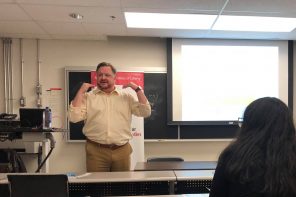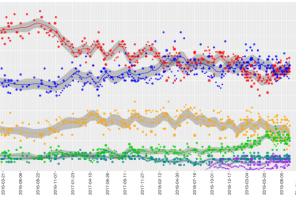*Content Warning: Sexual violence, genocide
Journalist Sally Armstrong, known to many as “the war correspondent for the world’s women,” delivered a lecture on October 24 through McGill’s Max Bell School of Public Policy. Touring on the back of her new book, Power Shift: The Longest Revolution, and the CBC’s Massey Lectures series, Armstrong explored the historical roots of the patriarchy and its effect on women today.
Armstrong elaborated on many instances of faulty historiography, inconvenience, and failure due to male bias in the recent past, and demonstrated how this bias was harmful to its victims and society as a whole.
The driving force of the talk was Armstrong’s coverage of female victims in the Bosnian and Yazidi Genocides. Armstrong covered the Bosnian War in the early 90’s, and relayed the terrifying story of a grandmother who was raped by her captors, along with hundreds of other women, in a coordinated effort to ethnically cleanse portions of Bosnia-Herzegovina. Ultimately, the Bosnian War resulted in the declaration of systematic rape as a crime against humanity by international human rights courts, despite the fact that many of those who perpetrated the crimes go unpunished.
Armstrong also spoke about two sisters who were victims of the Islamic State’s genocide against the Yazidis. Forced into slavery by Islamic State fighters, they managed to escape and tell Armstrong their story. Following her original interview, Armstrong went back to meet with the sisters in their refugee camp as they planned on returning to their home. However, they remained unable to due to the death of their father and the total destruction of their former town.
According to Armstrong, these are but a few stories of rape being used as a tool of oppression or eradication and there are many others unfolding today. In Bangladesh, the Rohingya are still de facto stateless, despite UN recognition of the ethnic cleansing and widespread rape committed by the Myanmar military. In Xinjiang, Uyghurs are subject to arbitrary detention and mass surveillance as well as alleged widescale torture and rape. In Quebec, the recently completed National Inquiry into Murdered and Missing Indigenous Women and Girls outlines systemic sexual violence facing First Nations women.
Despite the horrific events Armstrong has covered, she remains optimistic that the future is female. As she finished her lecture, Armstrong pointed to young women such as Malala Yousafzai and Great Thunberg as new leaders. Quoting a proverb to finish out the lecture, “when they pushed us down, they didn’t know we were seeds.”








